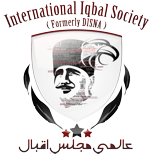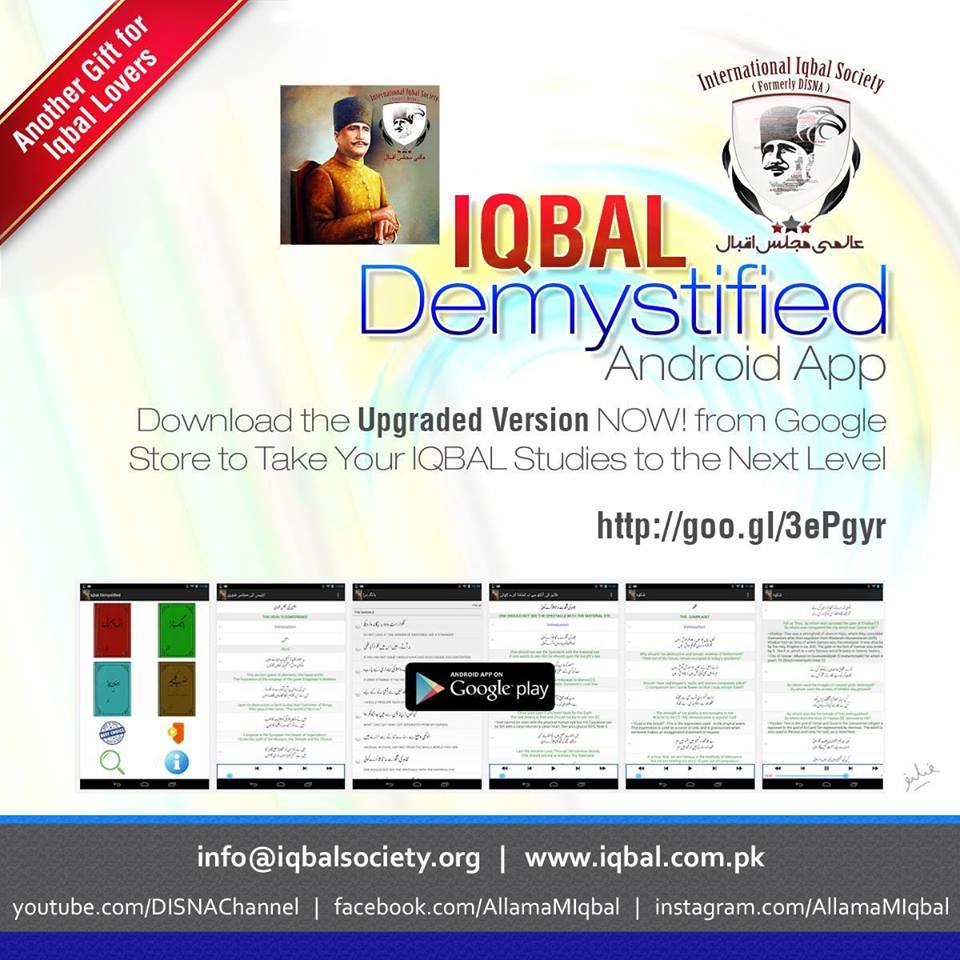A Rare Genius
By Dr. Mohammad Saleem
As we look through the lattice of history, we realize that the greatest hindrance in recognizing the excellence of a genius comes form his contemporaries. Allama Iqbal was one of those rare geniuses whose excellence in the field of poetry as well as political thinking was recognized throughout the world in his lifetime. He lived in the period when crores of Indians – Muslims, Hindus and nations of other religions – were fastened by the chains of British imperialism. During this dark period of slavery, disgrace and dishonour, Iqbal’s poetry imbibed a new spirit in the people and he himself played a significant role in the struggle for independence of the subcontinent. Allama Iqbal was the greatest Muslim political thinker of the last century. There is a general impression that although he was a great Muslim philosopher and poet of the East, he had throughout his life practically disassociated himself from political struggle. This is not true. In fact, politics is an important and glittering aspect of his multifarious activities. He understood the political movements of his time in their true perspective had a glimpse of the future movements casting their lengthy shadows on the canvas of his discernment and took practical part in the struggle for independence.
Looking into the past, one can easily realize how he was bestowed by nature the capability of exposing the political maneuvrings to deprive the Muslims of their due rights and project and the true picture before the Muslim world. We will describe his struggle for elections on the principle of separate electorate for the Muslims of India.
From the very beginning Iqbal was pleading the concept of separate electorate for the Muslims. He considered it imperative for the national discrimination of Indian Muslims and was not prepared to compromise on this issue at any stage. As Dr Javed Iqbal and Mohammad Ahmad Khan have stated, this was the axis of his political thinking. For this, he continued to fight Congress, quarrel with Jinnah and fret with Jauhar but did not deviate at all from his point of view. The Muslim leaders of Punjab (Allama Iqbal, Mian Fazal Hussain and others) were of the opinion that in the political interest of Muslims, it was essential that the elections should be held on the principle of separate electorate. The reason was that in the voting system prevalent at that time, the Muslim voters in Punjab were only 40%, although the Muslim population was more than 50%. Therefore, in the case of joint electorate, Hindus will capture all the Council seats. There was little hope that the British Government would recognize the principle of adult franchise. But even if this happened, there was a strong feeling that the economic superiority of Hindus would affect the results of the elections. Since, in Punjab, the Muslims were only in a small majority. Hindus will not allow such Muslim candidates to succeed who could defend the rights of the Muslims Consequently, in case of joint electorate, Hindus would form Government even in the Muslim majority provinces of Punjab and Bengal.
These were very strong arguments. Moreover, In the Muslim minority provinces, the Hindus were in such an overwhelming majority that the Muslim voters would be ineffective in changing the trend. The supporters of joint electorate were of the view that as every candidate had to appeal to the voters of the joint constituency, he would have to give up his communal style of address or at least on communal issues would address the voters in a low tone. Elections would be a contested only on national issues, mostly concerning economic progress and reforms. The leaders, instead of having communal approach, would try to solve the problems of the people from a national point of view. But the supporters of joint electorate just forgot that, in view of the Hindus mentality, there was little chance, almost nil, of a Hindu casting his vote in favour of a Muslim candidate. Even in the joint, electorate system was subject to the condition that a certain number of seats be reserved for the Muslims, only those Muslims would have an opportunity to win who after their success would be expected to take care of the rights of Hindus instead of those of Muslims.
In 1916, both the Muslim League and the Congress after mutual consultation, passed certain proposals consulting what is now called as Lucknow Pact. One of these proposals was that the principle of separate electorate be adopted for the Muslims. Thus, as the Congress had agreed to it, there was no contention in incorporating separate electorate for the Muslims in the Act of 1919. The Muslims were firm in their demand for separate electorate since 1906; no doubt, Pakistan would not have emerged without this system of elections. Therefore this clause of the Lucknow pact has a historical significance.
After about a decade, on the invitation of Jinnah, a meeting of 30 Muslims leaders was held in Delhi on 20 March 1927, so that a plan for permanent understanding between Muslims and Hindus may be drafted, as was desired by the then Congress President. At that time, Jinnah was of the opinion that the rights of the Muslims could be safeguarded even without implementing the system of separate electorate. After a careful consideration, these leaders recommended that:
- Sindh should be separated form the Bombay Presidency and constituted into a separate province.
- Reforms should be introduced in the North-West Frontier Province and Balochistan on the same lines as introduced in other provinces.
- The Muslims in the Punjab and Bengal be given seats in their respective legislatures in accordance with their population in these provinces.
- The weightage for Muslims in the Muslim minority provinces should be continued.
- In the Central Legislature, Muslim representation should not be less than one-third of the total number of seats.
If the Congress accepted these proposals, then the Muslims will accept the joint electorate. These proposals became known as “Delhi Proposals”.
On 15 May 1927, these proposals when presented by the Congress president were accepted by the All India Congress Committee. Sir Shafi, who was present in the Conference held on 20 March 1927, refused to accept these proposals on behalf of the Punjab Muslim League and declared that Muslim League will never give up its demand for separate electorate.
Allama Iqbal and other Muslim leaders were rightly of opinion that if principle of joint electorate was presented as a common demand of Muslims and the Congress, then the British Government would definitely implement it. This would result in the formation of Hindus Governments even in the Muslim majority provinces of Punjab and Bengal. Therefore, they did their best to show that Muslims were strongly against the joint electorate and that was true.
On 1st May 1927, a public meeting was held in Barkat Ali Hall, Lahore under the auspices of the Punjab Muslim League. Sir Shafi presided over the meeting. The following resolution proposed by Allama Iqbal was passed in the meeting:
The Punjab Provincial Muslim League reiterates its belief that the Central Legislative Council and Provincial Councils can be true representatives of the people only if the elections are held on the basis of separate electorate. Therefore, League is of definite opinion that until there is an effective arrangement for the safeguard of the rights of the minority, separate electorate for Muslims be retained as a fundamental part of the Indian Constitution.
In order to defeat the Congress attempts to introduce joint electorate system in India, a Conference was held in Delhi from 29 December 1928 to 1st January 1929, under the auspices of All Parties Muslim Conference. Agha Khan presided over the main session. After his presidential address, Sir Mohammad Shafi presented a resolution including a statement in which it was emphasized that Muslims will not give up the demand for separate electorate under any condition or circumstances. Presenting this resolution, Shafi said: Muslims of all shades and opinions are attending this Conference. Here are Ali Brothers, the great leaders of Khilafat Movement, Mufti Kafayatullah, the President of Jamiat-ul-Ulemai Hind, Maulana Shafi Daudi of Non Cooperation Movement, more than 100 members of the Central Assembly and Provincial Councils. And above all, the great personality who has been presiding over this meeting is unparalleled in the Islamic world. Even after viewing all this, if any one does not admit this meeting as the representative voice of Muslims, he is certainly a liar. The decisions we are making today are in consonance with the feelings of the Muslim nation. If the British Government does not accept these demands and tries to impose some Constitution against our wishes, we will never accept it.
Allama Iqbal seconded this. Speaking on this occasion, he said: If Muslims have to live in India as a nation, they must make immediate efforts for their progress and reforms and should prepare a separate political programme. There are certain parts of India where the Muslims are in majority and there are other parts where they are only a small minority. In this situation, it is imperative that we should have a separate political programme.
Speaking on the resolution, Iqbal said: I have a right to say that I am the first Indian who has realized the significance and necessity of Hindu-Muslim unity. It has always been my desire that this unity should be on permanent basis. However, the present circumstances are not in favous of joint electorate. The excerpts from the speeches of Hindu leaders, as given by the President (Sir M Shafi), reflect the mentality of Hindus. The Muslims are in minority, are economically backward and lack education. They are very simple and innocent people. The Government and Hindus both coax and cajole them easily. I only wonder at the mentality of even highly educated Hindus. If there was no other reason, this was itself sufficient for a demand for separate electorate.
Here are two items of the resolution passed by the Conference:
- Whereas, in view of India’s vast extent and its ethnological, linguistic administrative and geographical or territorial divisions, the only form of Government suitable to Indian conditions is a federal system with complete autonomy and residuary powers vestedinteh constituent states, the Central Government having control only of such matters of common interest as may be specifically entrusted to it by the Constitution.
- The right of Muslims to elect their representatives on various Indian legislatures through separate electorate is now the law of the land and Muslims cannot be deprived of that right without their consent.
The resolution proposed by Shafi and seconded by Iqbal was unanimously approved by the Conference. This ensured the success of the point of view of Iqbal and his colleagues.
It is interesting to note that Maulana Mohamad Ali Jauhar, while in London, wrote on 1st January 1931, only two days before his death, a letter to the Prime Minister of Britain and explained the standpoint of Indian Muslims. Inter alia, he stated that: We want to go back not with separate electorate only, not with weightage only for the Muslims but with freedom for India including freedom for the Muslims.
There is no doubt that new state of Pakistan emerge as, under the leadership of the Quaid-e-Azam. Muslim League contested the elections of 1946 under separate electorate for the Muslims, and won with overwhelming majority.
The political vision of Allama Iqbal is highly praise-worthy. He had noticed as early as in the beginning of the 20th century that the principle of separate electorate was essential to safeguard the rights of the Muslims in the subcontinent.
Source:
The Nation Monday, April 21, 2008






